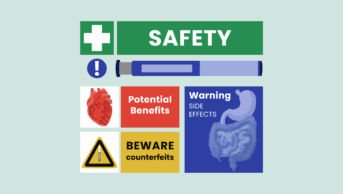
Jon Barlow
Claire Anderson, president of the Royal Pharmaceutical Society (RPS), has said that pharmacists and other healthcare professionals will give patients ‘sound advice’ on medicines use, following claims from US president Donald Trump that there is a causal link between paracetamol use in pregnancy and an increased risk of autism in children.
In a statement published on 23 September 2025, Anderson responded to the Trump administration’s claim that paracetamol use in pregnant women may cause long-term neurological effects in their children.
On 22 September 2025, the White House published a statement that said: “Evidence suggests acetaminophen use in pregnant women, especially late in pregnancy, may cause long-term neurological effects in their children.”
Paracetamol is known as acetaminophen in the United States.
In response to Trump’s claims, Anderson highlighted a study involving over 2.4 million children, results of which were published in 2024 and showed no evidence of a link between paracetamol use in pregnancy and an increased risk of autism in children.
“This research, which followed over 2.4 million children, provides reassurance for expectant parents that paracetamol remains a safe option for managing pain or fever during pregnancy when used as recommended,” she said.
“Paracetamol has been used safely by millions of people for decades, including during pregnancy, when taken as directed. It is the first-line choice for pain management and fever control in a variety of patients, including pregnant women, children and [older people].”
Anderson added that anyone with concerns about their medicines “should speak to a pharmacist or other trusted healthcare professional to ensure they are getting sound advice from a trusted source”.
The 2024 study was also referenced by health secretary Wes Streeting during a TV interview on 23 September 2025.
“There is no evidence to link the use of paracetamol by pregnant women to autism in their children. None,” Streeting said.
“Don’t pay any attention whatsoever to what Donald Trump says about medicines.”
On 23 September 2025, the Medicines and Healthcare products Regulatory Authority published its own statement, which said: “There is no evidence that taking paracetamol during pregnancy causes autism in children.
“Paracetamol remains the recommended pain relief option for pregnant women when used as directed,” it confirmed.
Olivier Picard, chair of the National Pharmacy Association, commented: “Paracetamol remains an effective and safe pain relief option for patients, including for pregnant women and leaving fever and pain untreated can pose risks to unborn babies.
“Pharmacies are following advice from UK regulators closely and are encouraging pregnant women to continue to take paracetamol as their first choice pain relief, where this is appropriate.”
In a letter to doctors in the United States, dated 22 September 2025, the US Food and Drug Administration said: “The use of acetaminophen by pregnant women may be associated with an increased risk of neurological conditions such as autism and [attention deficit hyperactivity disorder] in children.”
“Clinicians should consider minimising the use of acetaminophen during pregnancy for routine low-grade fevers,” it added.
However, that same letter acknowledged that “a causal relationship has not been established, and there are contrary studies in the scientific literature”.


